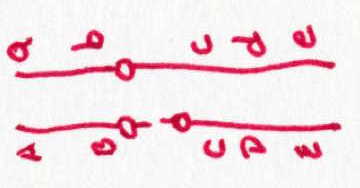Some species have different numbers of chromosomes, as we all know. Throughout evolution, how was a species able to survive with an extra chromosome? How was this organism able to breed successfully to form offspring with the additional chromosome?
-
1$\begingroup$ +1 good question. I guess that an added chromosome probably come from the duplication of another chromosome yielding to a partial polyploidy. Under this assumption it might be interested to look at the work of Sally Otto on change in ploidy number. I think we might intuitively overconsider the importance of such duplication on the functioning and health of the cell. I would tend to think that the big issue has to do with dosage compensation (amplitude of gene expression). Also, such duplications have the advantage to hide recessive deleterious allele. $\endgroup$– Remi.bCommented Apr 14, 2014 at 7:51
-
$\begingroup$ possible duplicate of Evolutionally speaking, why do humans have 46 chromosomes $\endgroup$– Daniel StandageCommented May 19, 2014 at 20:04
-
1$\begingroup$ I don't think those should be considered duplicates. On the other hand, I seem to remember another very similar question. Does anyone know it? $\endgroup$– jarlemagCommented May 20, 2014 at 9:22
-
$\begingroup$ possible duplicate of How are new chromosomes replicated into the next generation via sexual reproduction? $\endgroup$– fileunderwaterCommented May 20, 2014 at 20:37
1 Answer
Chromosome splits (or fusions for that matter) might not mean that much for reproductive success since genes can still line up and recombine. To quote the science blogger P.Z. Myers:
[C]hromosome numbers can change dramatically with no obvious effect on the phenotype of the organism.
He illustrates it thusly:

So to answer your first question, changes in the number of chromosomes aren't always fatally deleterious (as you seem to think).
As for how a change in chromosome number might spread, the explanation is likely random drift and inbreeding. To quote P.Z. Myers again:
So our two chromosome individual will have a reduced fertility as long as he or she is breeding with the normal one chromosome organisms, but those split chromosomes can continue to spread through the population. They are not certain to spread — they’re more likely to eventually go extinct — but by chance alone there can be continued propagation of the two chromosome variant.
"Evolution" by Mark Ridley, p. 361 similarly points out that reproduction will be an uphill battle until the new variant becomes more common (often through inbreeding or drift in small populations):
When a new chromosomal fusion mutation arises, it will be selected against because of its disadvantage in heterozygous form. But if it drifts up to a locally high frequency, as may easily happen in a local, small, and perhaps inbreeding, mouse population, natural selection will favor it. Natural selection favors whichever chromosomal form is locally common[.]
This might in the end lead to speciation due to the two populations becoming incompatible.
-
$\begingroup$ What about the very first organism to get an extra chromosome? Assuming it was a very small organism, wouldn't the need to replicate an extra set of chromosomes be very resource demanding to the organism and therefore possibly cause death? Or was this effect not very significant on the organism's chance of survival? $\endgroup$ Commented Jun 6, 2014 at 22:02
